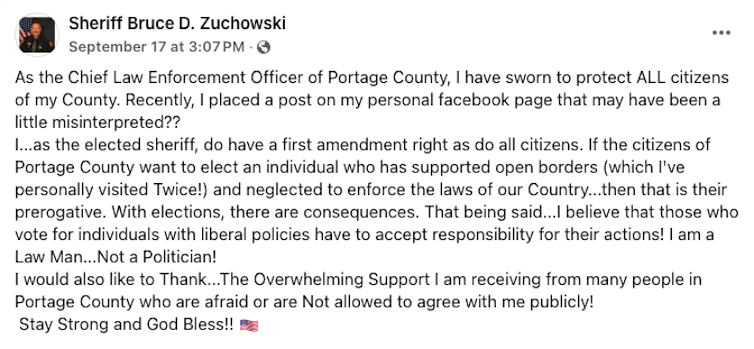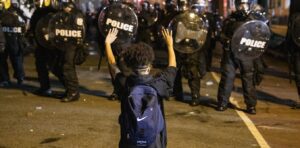How sheriffs define law and order for their counties depends a lot on their views − and most are white Republican men

Many Americans will find on their November 2024 ballot a space to vote for an important office: local sheriff. While there are exceptions, sheriffs have a long history of using their power to maintain a particular, unequal balance of power in society, often along racial and class lines.
A recent example of this arose on Sept. 13, 2024, when Bruce Zuchowski, sheriff of Portage County, Ohio, posted a message on a Facebook page headed by a graphic that included his official portrait and which was labeled with his official title. Zuchowski called for the public to write down the addresses of people who have campaign signs supporting Democratic nominee Vice President Kamala Harris in their yards.
That way, he said, when immigrants arrive and need housing, “We’ll already have the addresses of the … families … who supported their arrival.”
The post, which Zuchowski later claimed appeared on his “personal Facebook page,” used derogatory terms for immigrants and for Harris. It also included screenshots of two Fox News stories about migrants in Aurora, Colorado, and Springfield, Ohio, which are both places that former President Donald Trump, the Republican nominee, and his running mate JD Vance have falsely claimed to be sites of dangerous activity by immigrants.
The header of a page Sheriff Bruce Zuchowski claimed is a ‘personal’ Facebook page shows him in uniform and carries his full title.
Screenshot of a Facebook page

An Ohio sheriff posted an anti-immigrant message on Facebook.
Screenshot of a Facebook post
Sheriffs in the U.S. don’t often get national news attention, but Zuchowski’s request was covered in The Washington Post, NBC News and The Guardian, among others.
There are more than 3,000 sheriffs elected at the county level in the United States, each of whom has authority and autonomy to both set and enforce law enforcement policy. For example, sheriffs in many states can decide whether their deputies will wear body cameras and what happens to the footage recorded during routine stops.
In our book, “The Power of the Badge: Sheriffs and Inequality in the United States,” we provide a comprehensive look at this office and detail the history of sheriffs enforcing inequality both by using formal powers of their office, such as cooperating with federal immigration officers, and with informal powers, such as communicating about who belongs in their community.
Zuchowski’s post, which vilifies immigrants and targets people who support immigrant rights, is just part of that long history of sheriffs using their power as a tool of social control, as we document in our book.
Various sheriffs have participated in social control throughout American history. For instance, in the 18th century, an Alabama sheriff ran slave auctions and Georgia sheriffs played a central role in enforcing slave codes. In the 19th century, a Pennsylvania sheriff quashed union efforts to protect workers’ rights against exploitative businesses. In the 20th century, Southern sheriffs’ roles in voter suppression during the Civil Rights Movement are well documented. In the 21st century, racial profiling has been a problem in the enforcement of traffic laws by sheriffs in Arizona and California, among other states. Zuchowski is just one 21st-century sheriff entering the debate over immigration policy and immigrants’ rights.
Personal views affect public service
In the wake of Zuchowski’s post, The Portager, a news website in his community, reported residents saying the sheriff’s post constituted voter intimidation. Some residents have called for investigations of the sheriff’s office by local, state and national agencies, including the Department of Justice’s civil rights division.
So far, the Ohio Secretary of State’s Office says the sheriff has broken no laws.
In both our book and previous work, we document through two national surveys how variations in sheriffs’ views on race and ethnicity may shape their office’s policies and practices.
Zuchowski’s comments about immigrants, including calling them “Illegal human ‘Locust,’” denies their humanity by comparing immigrants to animals.
In our research, we have found that sheriffs’ negative attitudes toward immigrants are statistically correlated to their offices’ anti-immigrant policies. For instance, sheriffs with more negative attitudes are more likely to have an official policy to check the immigration status of crime victims and witnesses. That relationship held even after we controlled potential influence of other factors such as political partisanship and the share of the native-born population in a sheriff’s county.
Similarly, as we show in our book, sheriffs with racist views were less likely to report to us their deputies have been trained to reduce racial and ethnic bias in traffic enforcement. That issue is a problem in Portage County, according to the local NAACP, which in 2023 released a report claiming the sheriff’s office unfairly targets Black drivers.

Sheriff Bruce Zuchowski posted a defense of his earlier post.
Screenshot of a Facebook post
Politics plays a role
Since his initial post, Zuchowski has defended himself on social media, writing:
“If the citizens of Portage County want to elect an individual who has supported open borders (which I’ve personally visited Twice!) and neglected to enforce the laws of our Country … then that is their prerogative. With elections, there are consequences. That being said … I believe that those who vote for individuals with liberal policies have to accept responsibility for their actions! I am a Law Man … Not a Politician!”
Despite Zuchowski’s claims, he is indeed a politician. Like other sheriffs in the United States, he was elected by voters. He was the Republican nominee in 2020 and is running for reelection in 2024.
Like sheriffs across the country, Zuchowski had extensive law enforcement experience, including working in the Portage County Sheriff’s Office prior to running to head the office. We found that more than 85% of sheriffs worked for the previous sheriff before seeking election. And like most other sheriffs, Zuchowski is a white Republican man. We and others find that more than 90% of sheriffs are white and over 98% are men.
Across the United States, sheriffs will ask voters for their support this fall to remain in office. In most counties, these elections are uncompetitive: Sheriffs usually run either unopposed or against weak candidates.
In this way, Portage County is an exception. Zuchowski’s first election was a competitive race for an open seat, and he faces a challenger to his reelection bid in the 2024 election. His Democratic opponent, Jon Barber, is similarly a white man with a law enforcement background.
But Barber’s campaign website highlights another common challenge for voters: how to pick a good sheriff. His site focuses on transparency, accountability and community policing, with no discussion of immigration. Voters don’t get a clear message about any substantive differences that might exist between the two candidates.
Will Zuchowski’s comments matter for voters? Elsewhere around the country, voters have reelected sheriffs who have made anti-immigrant and racist comments.






